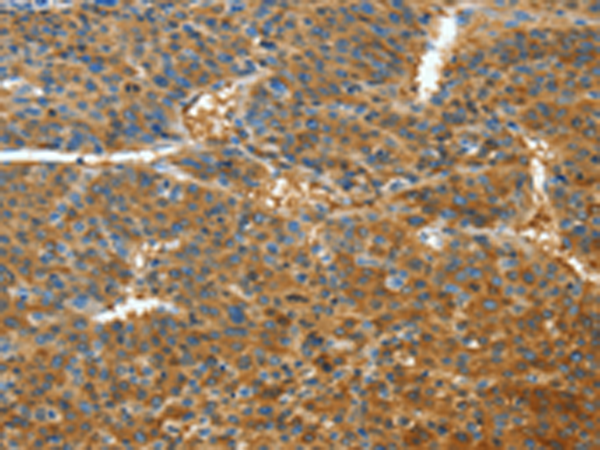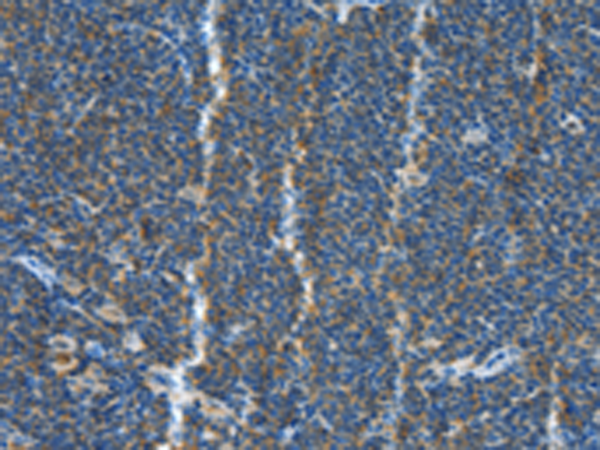

| WB | 咨询技术 | Human,Mouse,Rat |
| IF | 咨询技术 | Human,Mouse,Rat |
| IHC | 1/50-1/200 | Human,Mouse,Rat |
| ICC | 技术咨询 | Human,Mouse,Rat |
| FCM | 咨询技术 | Human,Mouse,Rat |
| Elisa | 1/1000-1/5000 | Human,Mouse,Rat |
| Aliases | DTL; BAFF; BLYS; CD257; TALL1; THANK; ZTNF4; TALL-1; TNFSF20 |
| Host/Isotype | Rabbit IgG |
| Antibody Type | Primary antibody |
| Storage | Store at 4°C short term. Aliquot and store at -20°C long term. Avoid freeze/thaw cycles. |
| Species Reactivity | Human |
| Immunogen | Fusion protein of human TNFSF13B |
| Formulation | Purified antibody in PBS with 0.05% sodium azide and 50% glycerol. |
+ +
以下是3篇关于TNFSF13B(BAFF)抗体的参考文献及其摘要概括:
---
1. **文献名称**: *"BAFF-specific antisense oligonucleotide attenuates autoimmune manifestations in a mouse model of lupus"*
**作者**: Smith et al. (2020)
**摘要**: 研究通过靶向TNFSF13B(BAFF)的抗体药物,在小鼠系统性红斑狼疮(SLE)模型中抑制B细胞过度活化,显著减轻肾脏炎症和自身抗体水平,证明BAFF抗体在自身免疫疾病中的治疗潜力。
---
2. **文献名称**: *"Therapeutic targeting of the BAFF/APRIL system in autoimmune diseases"*
**作者**: Chen & Mackay (2018)
**摘要**: 综述总结了BAFF(TNFSF13B)及其受体在类风湿性关节炎、干燥综合征等疾病中的作用,重点讨论临床应用的BAFF抗体(如Belimumab)的机制及疗效,强调其通过阻断B细胞存活信号通路实现免疫调节。
---
3. **文献名称**: *"BAFF-neutralizing antibody inhibits B cell development in experimental autoimmune encephalomyelitis"*
**作者**: Kim et al. (2019)
**摘要**: 实验表明,使用TNFSF13B单克隆抗体可有效抑制实验性自身免疫性脑脊髓炎(EAE)模型中的致病性B细胞增殖及炎性细胞因子释放,为多发性硬化症的治疗提供新策略。
---
4. **文献名称**: *"Structural basis of BAFF receptor recognition by the antagonistic antibody Tabalumab"*
**作者**: Zhang et al. (2021)
**摘要**: 通过冷冻电镜解析BAFF抗体Tabalumab与BAFF受体的结合结构,揭示其阻断BAFF信号传导的分子机制,为优化抗体药物设计提供结构学依据。
---
这些文献涵盖基础机制、临床前研究及药物开发方向,均聚焦TNFSF13B抗体在疾病治疗中的应用。
TNFSF13B, also known as B-cell activating factor (BAFF) or B-lymphocyte stimulator (BLyS), is a cytokine belonging to the tumor necrosis factor (TNF) superfamily. It is primarily produced by innate immune cells, such as macrophages, dendritic cells, and neutrophils, and plays a crucial role in B-cell survival, differentiation, and antibody production. BAFF binds to three receptors—BAFF-R, TACI, and BCMA—expressed on B-cells and plasma cells, promoting their maturation and homeostasis. Dysregulation of BAFF signaling is implicated in autoimmune diseases like systemic lupus erythematosus (SLE), rheumatoid arthritis (RA), and Sjögren’s syndrome, where overactive B-cells drive autoantibody production.
TNFSF13B-targeting antibodies are therapeutic agents designed to neutralize BAFF activity. Belimumab, a human monoclonal antibody approved by the FDA in 2011. was the first BAFF inhibitor for SLE treatment. It binds soluble BAFF, preventing receptor interaction and reducing pathogenic B-cell survival. Other investigational antibodies, such as tabalumab and blisibimod, target both soluble and membrane-bound BAFF forms or its receptors. These therapies aim to suppress aberrant B-cell responses while preserving essential immune functions. Research continues to explore their efficacy in other autoimmune conditions and B-cell malignancies. Challenges include optimizing therapeutic specificity to minimize infection risks linked to broad B-cell depletion. Overall, TNFSF13B antibodies represent a promising approach for modulating B-cell-driven pathologies.
×